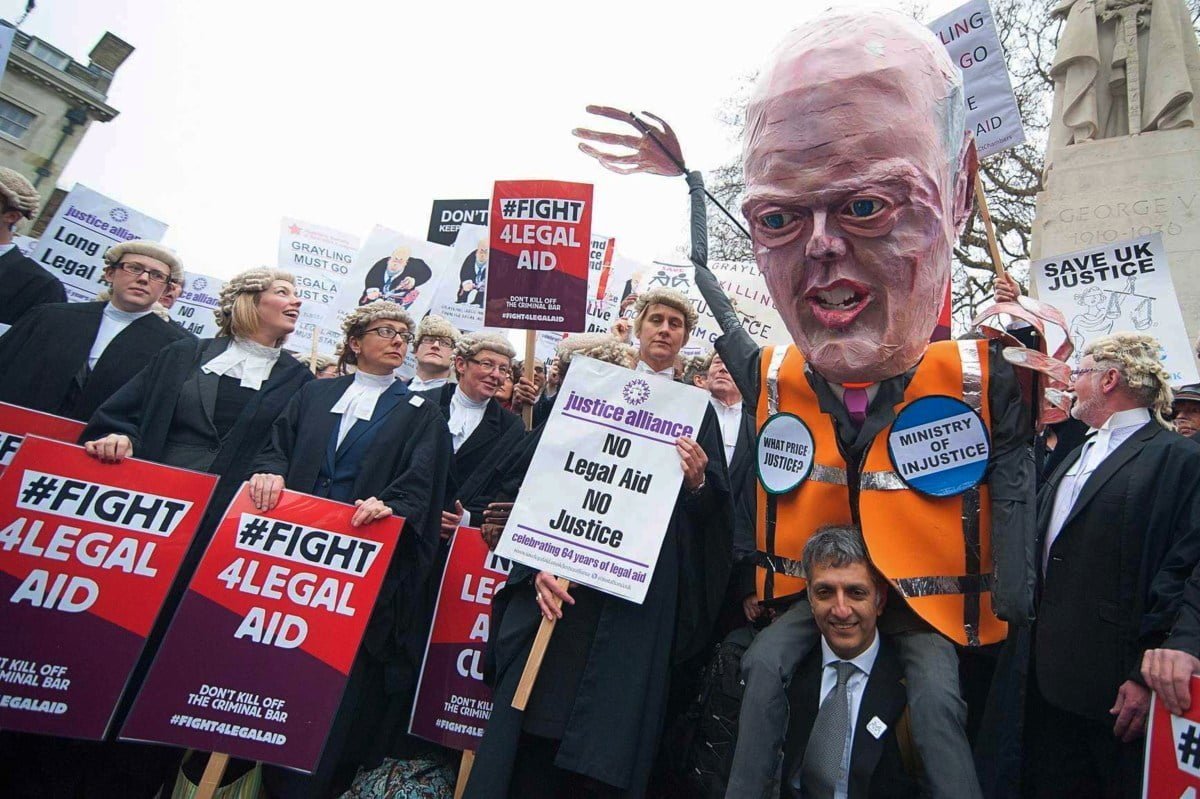This letter from a criminal defence lawyer graphically outlines the crisis facing Britain’s justice system as a result of cuts and privatisation.
Since 1st April 2018, barristers in England and Wales that are members of the Criminal Bar Association (CBA) have been refusing to accept any new legal aid Crown Court cases. This action follows on from events earlier this year, when the CBA polled its members and got over 90% support for a boycott of any new legal aid work.
The barristers are in dispute with the Ministry of Justice over recently imposed cuts to their legal aid pay rates. The latest fee cuts are the straw that has broken the camel’s back. The rates have already fallen by 40% in real terms since 2007.
In addition to the barristers, criminal defence solicitors in legal aid practice are also in dispute with the government. They’ve been hit with a massive reduction in the amount of pages of prosecution evidence that they can be paid to read when preparing a case for trial. On 1st December 2017 the cap was reduced from 10,000 to 6,000 pages. The Law Society has taken the issue to judicial review and a court decision is awaited.
It appears that the barristers boycott is solid and that Crown Courts up and down the country are beginning to see defendants appear at court without legal representation. Solicitors have been helping by being ‘unable’ to find alternative counsel willing to represent their clients.
Up to now, most of the judges at the Crown Courts have been sympathetic, and have been adjourning hearings as much as they are able to. However, as the dispute rolls on, a large backlog of cases is building up and the courts are starting to grind to a halt.
Impossible position
 Those that are bearing the brunt of the cuts to barristers’ legal aid are those at the junior end of the profession.
Those that are bearing the brunt of the cuts to barristers’ legal aid are those at the junior end of the profession.
Criminal barristers might have to wear silly-looking clothes and look and sound like they’re posh, but the truth is that much of the Junior Bar are from working class and ethnic minority backgrounds, and aren’t particularly well paid. Most of their work is paid for by the legal aid system, simply because most defendants cannot afford to pay for their own legal representation.
The situation for young would-be barristers has now become impossible to maintain. Trainee barristers, known as pupils, can now earn as little as £12,000 per year working in legal aid cases. They often never get the opportunity to fully complete their pupillages and move up to being junior barristers.
These are people that have often got student debts in excess of £50k to pay for. With legal aid rates being remorselessly pushed down year on year, junior barristers who aren’t from financially well-off backgrounds face a lifetime of debt slavery. The criminal bar is at risk of reverting back to what it once was in the past: the preserve of those from the wealthy elite.
Breaking point
This dispute comes at a time when every sector of the Criminal Justice System has been attacked by the Tory government, as part of its austerity programme.
I am a solicitor with 20 years of experience in criminal defence, and I have never seen conditions as bad as they are now. In many ways it feels like the whole system is at breaking point.
In recent years, police numbers have declined significantly. This is entirely due to government cuts. Neighbourhood policing has all but disappeared, and there has been a wave of consolidations and mergers of different police force areas. These have been implemented in the hope that reducing back office staff will help to avoid any further reductions in police officer numbers. All this has had a negative effect on police morale.
I am a duty solicitor and I spent a recent Sunday night representing clients at a British Transport Police (BTP) Police Station custody centre in London. It was a very busy night, and I didn’t get much sleep.
The officers there seemed fed up and demoralised. They told me that the other BTP custody centres in London had been closed. They are worried that soon there won’t be a single one left in London at all, as they’d heard about a management plan to move BTP cases to Bishopsgate Police Station and share the custody facilities there with the City of London Police instead. One officer said that he will be taking early retirement instead of working out his full career term.
Privatisation and cuts
 The probation service has been partially privatised and has suffered big funding cuts. Prisons are falling into chaos. Tory cuts to the prison service have led to a steady decline in prison officer numbers and a sharp increase in levels of violence and self-harm amongst prisoners, who are routinely locked in their cells for 23 hours a day or more.
The probation service has been partially privatised and has suffered big funding cuts. Prisons are falling into chaos. Tory cuts to the prison service have led to a steady decline in prison officer numbers and a sharp increase in levels of violence and self-harm amongst prisoners, who are routinely locked in their cells for 23 hours a day or more.
All pretence at rehabilitation of those convicted of criminal offences has gone. Prisons have become nothing more than warehouses for human beings.
I recently went to Pentonville prison in London to represent a client who was being interviewed by the Police about an armed robbery. After going through all the security checks and rub down searches, I had to wait half-an-hour before being told to go away because there simply weren’t enough staff available to find him and bring him to the visitor centre.
These sorts of frustrating experiences are not unusual. However, what really shocks me is the way that the levels of violence have increased so much in what seems like such a short period of time. I frequently hear from clients of mine of the confrontations and fights that they get into in prison, and the lack of staff to turn to for help.
In late 2016, one of my clients was killed when he was stabbed and thrown from a 5th floor balcony at Pentonville by three other prisoners who had gone up to his wing armed with knives. At the subsequent murder trial it transpired that the CCTV camera that might have captured the whole incident had not been working for two years. Nobody was convicted of that young man’s murder.
Decline and deterioration
 It’s not just the prisons that have deteriorated. In recent years there has been a steady programme of court closures, with court users having to travel much longer distances to attend court hearings than ever before. Those court buildings that do remain open are falling into a poor state of repair. Recently, the only lift at Highbury Corner Magistrates Court broke down and wasn’t repaired for over two months.
It’s not just the prisons that have deteriorated. In recent years there has been a steady programme of court closures, with court users having to travel much longer distances to attend court hearings than ever before. Those court buildings that do remain open are falling into a poor state of repair. Recently, the only lift at Highbury Corner Magistrates Court broke down and wasn’t repaired for over two months.
During the cold winter weather last February, many court buildings were freezing cold because the heating was turned down to save money. When I first started in the job there used to be subsidised cafeterias at most courthouses, but I can’t think of a single one that is still open. Many of the court toilet facilities are disgusting and unhygienic.
Criminal legal aid solicitors are becoming an endangered species, as the outlook for solicitors firms that are reliant on criminal legal aid gets more and more precarious each year. Several well-known firms have given up doing criminal legal aid work, or even gone out of business. With inflation constantly eating into the value of what they get paid, they are finding it increasingly difficult to meet their overheads, which of course have gone up every year without fail.
In some areas of the country – in mid-and-west Wales, and the west of England for instance – there is now such a shortage of solicitors that are prepared to do duty solicitor work that there are concerns that ‘advice deserts’ will start to open up.
To illustrate how the position of solicitors working in criminal legal aid has deteriorated over time: at a meeting of criminal defence solicitors that met last month to discuss how to help the barristers in their dispute, someone held aloft a case file from 1978 that he had retrieved from the archive. It was a straightforward magistrates court legal aid guilty plea case, for which he had been paid about £440. Allowing for inflation, at today’s values that £440 would probably be worth in excess of £1,000. Shockingly, he then held up a very similar case file that he said he had been paid earlier this year for just £250.
No justice under capitalism
The solicitors organisations and professional bodies are generally supportive of the action that the barristers are taking. They have agreed not to undermine them by attending court or trying to fill the gap by representing the clients themselves.
It is likely that the Tories will look for a face-saving way out at some stage, provided that the mood of the barristers remains as solid as it has been up to now. As the Crown Courts start to clog up with unrepresented defendants over the course of the next few weeks, the government will probably decide to back down and reach a compromise of some kind.
But whatever the outcome of the dispute this time around, the wider battle for a properly funded criminal justice system will still need to be fought.
There needs to be a concerted and united campaign by all those who work within the criminal justice system, across all sectors – be they lawyers, courts and prison staff, and probation officers – for a reversal of all the cuts, privatisations and outsourcing that has taken place over the last decade.
I firmly believe that crime is a by-product of capitalism: a society that is inherently violent and exploitative. Many of my clients are tough individuals, brutalised by poverty and social deprivation. In many ways they are victims too – victims of circumstance.
As long as we have a society divided by class and based on the economic exploitation of the many for the benefit a wealthy few, then sadly there will always be a role for police, courts, prisons and a codified criminal legal system.
As a socialist I look forward to the day when the abolition of capitalism and class exploitation brings about the disappearance of crime and violence, and with it any need for these instruments of repression.






